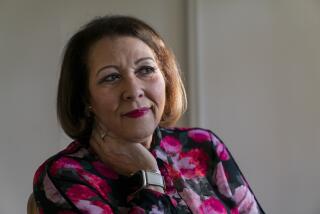MEDICINE / BREAST CANCER : Nationwide Study to Test Bone Marrow Treatment
- Share via
SAN DIEGO — Three Southern California research facilities have joined a nationwide study of an experimental bone marrow transplant treatment for breast cancer. The procedure will be covered by Blue Cross-Blue Shield, marking the first time a private insurer has agreed to fund experimental research, company officials said.
The research is part of a nationwide National Cancer Institute trial comparing the standard approach, chemotherapy, with the experimental one, bone-marrow transplants and high-dose chemotherapy for breast cancer victims in advanced stages of the disease.
Scripps Clinic, the USC’s Kenneth J. Norris Jr. Cancer Hospital and St. Joseph’s Hospital in Orange confirmed Wednesday that they will join 37 other cancer research centers around the country in the four-year project to study 1,200 women. Of these women, 600 will receive the experimental treatment; the others will be treated with standard chemotherapy. The experimental therapy, which requires much more hospitalization, can cost up to $150,000--or about four times the price of conventional chemotherapy.
High doses of chemotherapy kill malignant cancer cells, and the higher the dose, the less likely it is that the cells will develop a resistance to the drugs, according to recent studies. But those high doses also kill bone marrow, which produces crucial disease-fighting white blood cells.
In the experimental treatment, called autologous bone marrow transplantation, doctors use a needle to remove the patient’s bone marrow. The marrow is frozen after being treated with an anti-cancer drug to wipe out renegade cancer cells.
Next, the patient is treated with massive doses of chemotherapy, three to six times the standard amount, said Dr. Lawrence Piro, director of the Green Cancer Center at Scripps Clinic.
In fact, the dose is so high that patients are usually hospitalized for about 30 days in an intensive-care unit--a measure that contributes a large portion of the overall cost. The high dose is administered in an attempt to eradicate what might be resistant or dormant cancer cells.
After the chemotherapy, the frozen bone marrow is thawed and infused into the patient.
In recent years, Blue Cross-Blue Shield has been hit with more than a dozen lawsuits in which patients sought to force the insurer to cover these costs. The company, one of the nation’s largest, lost half of these suits, said spokeswoman Cheryl van Tilburg.
“The lawsuits are indicative of the amount of conflict and controversy about whether this procedure is effective,” Van Tilburg said. “We feel the courts are not the most appropriate place to be fighting this one out. Research is the only way we can find out once and for all.”
Much of the insurance industry regards the aggressive marrow transplant-high-dose approach as far too experimental and unproven to cover. In fact, among the 73 chapters of Blue Cross-Blue Shield, there is no clear consensus on whether to cover it.
Blue Cross of California started covering it last February for patients with certain categories of advanced stages of the disease. California Blue Shield does not pay for the treatment. “But we could decide to join the project,” said spokesman Mke Odom.
Across the nation, 15 chapters of Blue Cross and Blue Shield--insuring about 21 million members--have opted to join the NCI research. Each chapter has set aside $30 million to $40 million to pay for the women’s treatment, Van Tilburg said.
At St. Joseph’s Hospital, the trial is open only to patients who are covered by a participating Blue Cross-Blue Shield chapter, said Dr. Winston Ho, director of the bone marrow transplant program.
At Scripps, the trial is open to patients whose insurance company will cover the cost and is not limited to Blue Cross-Blue Shield coverage, said spokeswoman Sue Pondrom. At USC, officials have not yet decided which patients will be eligible for the study, said Dr. Dan Douer, associate professor of medicine.
In San Diego, the study will focus on women who have had breast cancer surgically removed but are at high risk for a recurrence of the disease, Piro said. This group will include women with advanced clinical stages of breast cancer, or cases where more than 10 lymph nodes were contaminated with cancer at the time of surgery, he said. These women have a 50% chance of suffering a relapse.
Breast cancer strikes an estimated 150,000 women in the United States each year. When the cancer is located solely in the breast, surgery, chemotherapy and radiation can effectively halt its spread. At this early stage, the five-year survival rate is 90%, according to the American Cancer Society.
But if the cancer has spread to other organs, the five-year survival rate plunges to 18%. Each year, breast cancer kills about 44,000 women nationwide; in California, the disease kills 4,200.
“Obviously, anything we can do to reduce the number of women who die would be very important since so many women are diagnosed with breast cancer,” said Dr. Michael Friedman, associate director of the National Cancer Institute’s cancer therapy evaluation program. “These are very important clinical studies. For (advanced-stage) cancer patients, we don’t currently have a way of curing the disease.”
According to a study conducted last year at Harvard Medical School, 58% of the patients who received this aggressive treatment at 13 medical centers had no cancer after one year. Under conventional therapy, fewer than 30% of patients had no cancer after one year.






